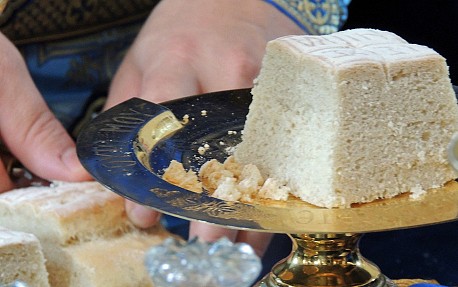Commemorating the Living and the Departed during Divine Liturgy
Commemoration Forms Linked HERE
The Orthodox remember our living and departed loved ones in our daily prayers, both Orthodox and non-Orthodox. We also provide the names of our loved ones to our parish priest for commemoration during Divine Liturgy.
For our Orthodox loved ones, these prayers occur during the Proskomedia, or the service of preparation before the actual Divine Liturgy begins. The priest takes out particles of prosphora for the living saying, “Remember, O Lord, thy servant…,” and for the reposed, “Remember, O Lord, the soul of thy servant…” As St. Symeon of Thessaloniki writes “...because it (the particle) is placed near the eucharistic Bread, when that becomes the Body of Christ in the course of the Liturgy, the particle too is immediately sanctified. And when it is placed in the Chalice, it is united with the holy Blood. That is why it transmits divine grace to the soul of the one for whom it is offered. So a spiritual communion takes place (between that person and Christ). If (the person commemorated) is among the godly, or those who have sinned but then repented, that person receives the communion of the Holy Spirit invisibly in his soul.”
This is a mystery, something we cannot fully comprehend, and yet we believe the truth of it completely. Referring specifically to commemorations for the departed (which also applies clearly to the commemorations for the living), St. John Damascene writes: “The mystics and witnesses of the Word—the disciples and Apostles of the Savior sent round the world—ordained the commemoration of the departed faithful during the Dreadful and Immaculate and Life-giving Mysteries. Truly and very incontrovertibly the Apostolic and Catholic Church has done this to the present throughout the world and will continue to do so until its end. This they (the Apostles) inaugurated not thoughtlessly or at all in vain.”
St. John Chrysostom adds: “Not by accident did the holy Apostles decree that the departed would be commemorated in the presence of the awesome Mysteries. They knew that there is much to be gained from that, much benefit.”
From the life of St. Philaret of Moscow, we learn of the following remarkable account:
A certain priest was particularly diligent in praying for the dead whose names were given to him to be remembered at the Liturgy. He used to copy out these names into his private notebook and pray for them all his life. The names accumulated, and eventually his notebook contained so many thousands of names that he was forced to divide it into sections and take up one section a day.
It so happened that he fell into some sin which threatened him with losing his priestly rank. The matter reached Metropolitan Philaret. As the Metropolitan was about to sign a resolution stating that the priest should be removed from his duties, he suddenly felt his hand grow heavy. He thus postponed signing the document until the following day. That night he had a dream wherein he saw a great crowd assembled under his windows. In the crowd there were people of all ages and walks of life. The crowd was agitated and finally addressed to the Metropolitan some kind of plea. “What do you need?” asked the Bishop, “and who are you?” - We are departed souls and have come to you to plead for our priest. Do not remove him from his office.” Philaret, greatly impressed by this dream, was unable to forget it after he awoke. He had the accused priest brought before him. “What good deeds have you done? Tell me,” asked the Metropolitan. “None, my Lord,” the priest answered, “I deserve being punished.” “Do you pray for the departed?” asked the Metropolitan. “Well, yes, my Lord, always; it is a rule with me always to remember all whose names are handed to me, and I always take out parts of the prosphora for all of them, so much that my parishioners have begun complaining that my proskomedia is longer than the Liturgy itself. But I cannot do otherwise.” The Metropolitan limited himself to transferring the priest to another parish, having first explained to him who it was that had interceded for him.”
St. John Maximovich relates the following, regarding the importance of commemorations at Divine Liturgy:
Before the opening of the relics of St. Theodosius of Chernigov (1896), the priest who had revested the relics sat down exhausted near the relics and dozed off. As he was sleeping, the hierarch appeared to him and said, “Thank you for laboring on my behalf. I also ask that when you serve the Liturgy, You commemorate my parents,” and he gave their names, Priest Nikita and Maria. “How is it that you, a holy hierarch, are asking my prayers, when you stand at the throne of Heaven and grant people God’s mercy?” asked the priest. “That is true,” replied the Saint, “but the offering at the Divine Liturgy is more powerful than my prayers.”
Abundant grace flows from the Divine Liturgy. We are given the opportunity to participate by way of submitting for commemoration the names of our dearly loved living and departed. We indicate if our loved ones are Orthodox or non-Orthodox so that the priest can know who he should include in the Proskomedia. But all receive prayer.
Who can be provide lists for commemoration and who can be commemorated?
-
Only Orthodox Christians, and only those without impediment to receiving the Sacrament, may offer names for the living and departed.
-
Only Orthodox Christians may be commemorated on the diskos at the Proskomedia.


